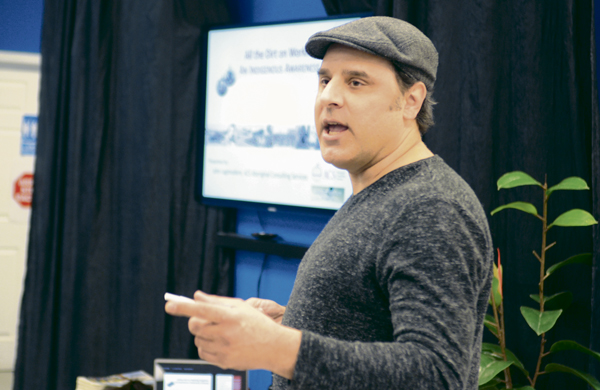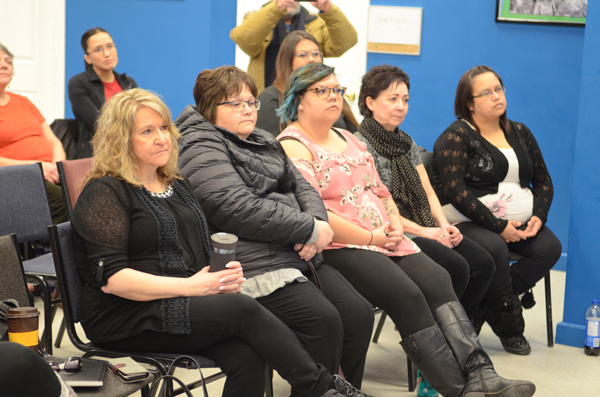
The Métis Addictions Council of Saskatchewan (MACSI) is celebrating its 50th anniversary.
The organization, which operates treatment centres in Prince Albert, Saskatoon and Regina, kicked off its celebration with a press conference at the Prince Albert location Thursday.
MACSI provides inpatient and outpatient support, as well as a stabilization program that is “status-blind”, meaning it is open to First Nations, Métis and non-Indigenous residents.
“We are extremely proud and pleased to celebrate 50 years as a community-serving organization in Saskatchewan,” communications manager Shayne Lazarowich said.
The organization operates publicly-funded treatment in partnership with the provincial ministry of health. While the organization is run by a board of directors, it falls under the umbrella of the Métis Nation-Saskatchewan.
MACSI incorporates traditional aboriginal teachings in its care, and according to Lazarowich, works to advance healing and reconciliation.
To celebrate the organization’s 50th anniversary, MACSI is holding a number of events across the three communities in which it operates.
Training for Prince Albert staff on some Aboriginal awareness is part of that 50th-anniversary celebration. That training got underway Thursday at the Prince Albert Multicultural Council, as staff listened to John Lagimodiere of Aboriginal Consulting Services and Eagle Feather News.
MACSI is also hosting an open house at its 334 19th Street East location on March 14, and a Métis Kitchen Party sober dance at the Prince Albert Exhibition Centre on May 11.
But while a 50th anniversary is a time to celebrate, it’s also a chance for the organization to take a look at what it can do better as the landscape of drug and alcohol addiction evolves.
MACSI’s inpatient unit provides a 28-day program. That treatment, as well as several other programs, were developed around alcohol abuse.
Alcohol is no longer the primary substance MACSI sees in its clients.
Rather, the organization is dealing with a significant rise in the number of people addicted to crystal meth.
“A lot of those needs have changed. People are using different kinds of drugs, and the time you need to get off of some of these drugs is longer,” Lazarowich explained.
“We are sincerely looking at some adaptation or restructuring or our program.”
Angela Impey is the regional director for the Prince Albert branch. She’s watched as more people struggling with addictions to crystal meth, cocaine and other drugs come through the organization’s doors looking for help.
“Crystal meth has overpowered alcohol at this point,” she said.
Many clients also abuse other substances, such as alcohol.
“They’re going hand-in-hand is what we’re seeing. Alcohol has a serious impact on the clients, but the more clinical impact, and medical impact, is the crystal meth use.”
Crystal meth use and detox from the drug is a lot more complicated than with alcohol. Use and withdrawal can cause symptoms such as psychosis. And while detoxing can take between seven and ten days, other symptoms can last for months, or even years.
“For crystal meth, it (can) take a year for the brain to heal. They go through what is called post-acute withdrawal symptoms and other symptoms of withdrawal that could take a longer period of time to stabilize than somebody coming off of alcohol,” Impey said.
Some people don’t make it through the initial stabilization.
“The withdrawals are so intense, often they don’t make it through the stabilization period enough to make it to long-term recovery. It’s going through that intense withdrawal that’s the struggle,” Impey said.
While the use of stronger drugs such as crystal meth and opioids do cause difficulties with treatment, MACSI is finding ways of working with the resources they have.
“We are, for the most part reaching capacity,” Impey said.
“It’s an ongoing intake so when somebody discharges, someone else is coming in.”
The organization is having trouble keeping up with all of the referrals they receive. The Prince Albert location has 14 inpatient beds and a wait list of 34. MACSI uses its other locations and referrals to other treatment programs to help keep the waitlist down.
“A lot of our referrals are coming from northern communities. There are some from addictions services in Prince Albert, but a high volume of ours are coming from the north,” Impey said.
While the inpatient program is a 28-day stay, that can be extended by a week or ten days. Cases are handled individually based on a client’s needs.
“Part of the treatment care and planning counsellors do with their clients is look at community referrals and resources,” Impey explained. “They do link them up.”
To help patients buy-in to care after they’ve finished their stay, counsellors help patients book their own appointments.
But while they’re doing their best, MACSI knows they will have to start looking at other situations to evolve their services as the reasons behind substance abuse and the drugs used continues to evolve.
Andrea Parenteau works with MACSI in Prince Albert as a counsellor. She works individually with the clients who come in to try to help them to get and stay sober.
“They say it’s an epidemic because it is,” she said about opioid use in the province.
Parenteau had some insights about why someone might turn to crystal meth.
“They might have started out at a young age with alcohol, and then it just progresses into other things. They come in with not only their addiction. It’s their background or lifestyle, the grief, the trauma in their life.”
Parenteau said people who use crystal meth are often introduced to the drug by others. The high lasts longer than with alcohol or crack cocaine, and it’s comparatively cheaper to buy. People will discover the drug at parties or from other extended family members, and then it spreads from there.

“Substance abuse is (intergenerational),” Impey added.
“They grew up in that environment, they view it as a nom, a way of coping. And then they get linked up with other peer groups that introduce other substances.”
For Indigenous people who have relatives who experienced trauma at residential schools, that method of coping through something like alcohol is passed down. But according to Impey, time spent away from home at residential school also means people haven’t necessarily been exposed to healthy parenting, and lack those skills to pass on to the next generation.
“There’s a story to why they’re using. There are things that come with that,” Parenteau said.
“Grief, trauma, homelessness.”
“It’s a generalization, but I think MACSI gets a lot of clients from very vulnerable backgrounds or situations,” Lazarowich added.
“ Nobody who comes to MACSI has 10-12 grand to pay for private care. There are a lot of underlying issues.”
Grief, trauma and homelessness do not discriminate, and they make it harder for someone to continue to cope once they’re released from a month-long program.
“We have a lot of First Nations, Métis and non-(Indigenous people) who are dealing with those issues. And homelessness is a big one,” Impey said.
“We try to link them up with Our House and the YWCA, but if they’re returning to the north, housing is very limited.”
Some of those residents in northern communities don’t have any access to mental health care either.
“Growing up with this trauma and grief, they carry this for 40-50 years,” Parenteau said.
“I have clients (where) this is the first time they’ve ever talked about it. That’s a long time, 40-50 years. This is their journey to start healing.”
All those factors have MACSI looking to encourage a more holistic approach to treating people struggling with addiction.
“We’re looking at expanding into housing because a lot of these issues are linked,” Lazarowich said.
“(One) of the things we’re looking at now is a transitional housing program. That would be a two-year sober living facility for many homeless clients that come through our centres that would support folks that are sent directly back on the streets and risk relapse.”
Other plans include increasing mental health support for addicted clientele and developing more strategies to deal with challenges such as crystal meth, opioid and crack cocaine addictions.
“The province is definitely in need of more treatment centres and longer stays,” Impey said.
“That’s where it’s helpful to look at longer-term treatment or more selective centres that are going to focus on certain drugs that the program is tailored to. Those are all things MACSI is looking at for the programming we’re offering. We’re being very thorough in our audit of what we are doing for programming.
“We’re… having all of those discussions so we are able to hopefully provide more quality and selective programming to the evolving substance abuse.”

